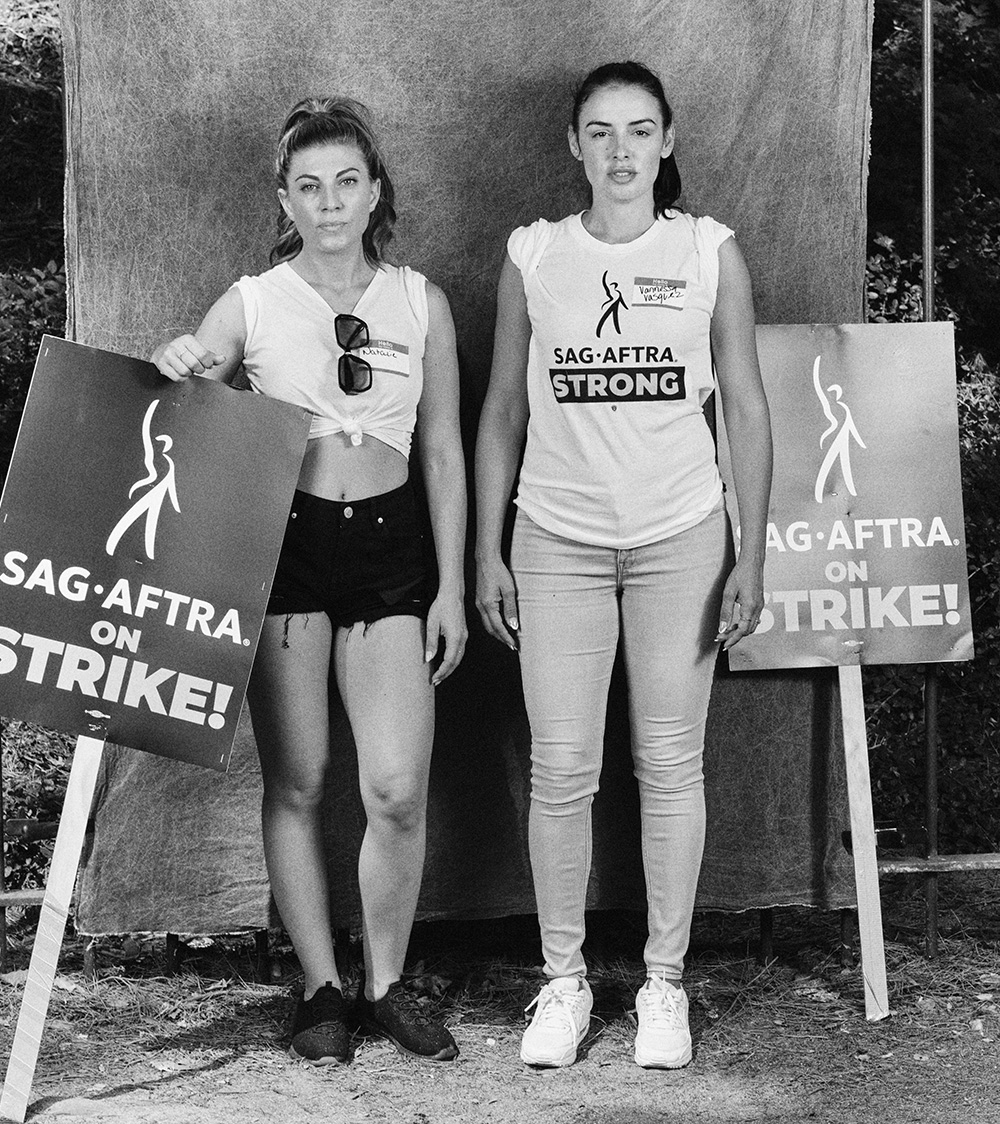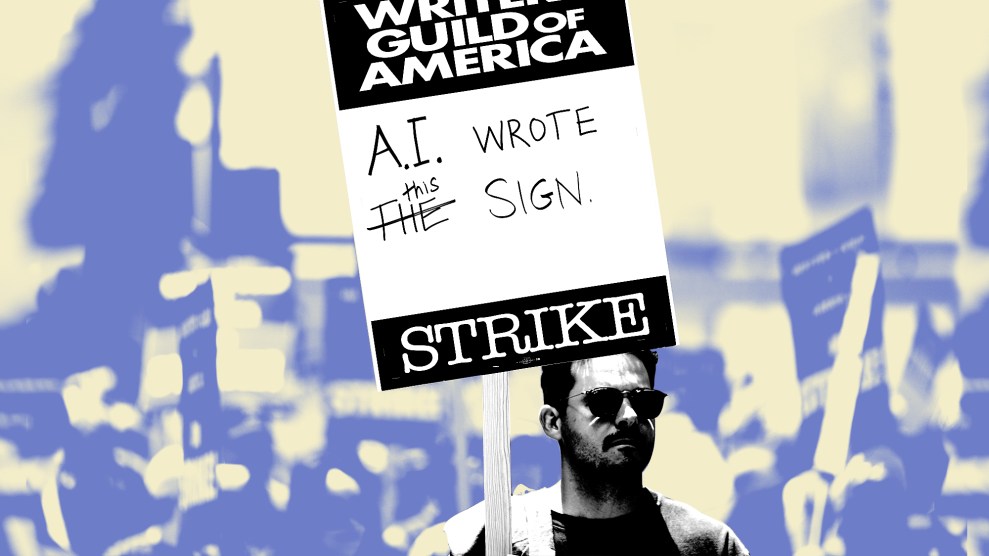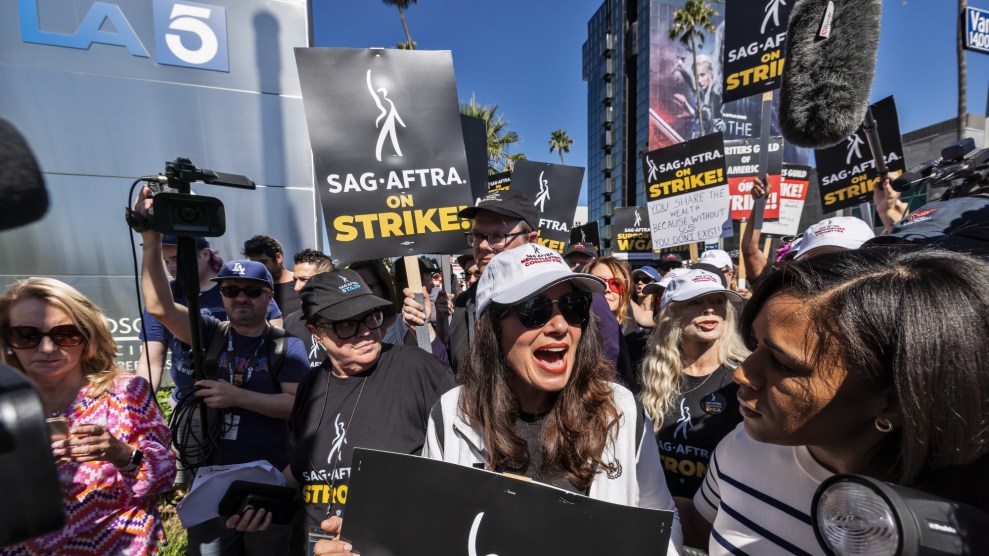For more than 100 days, Hollywood writers have been on strike; in July, actors joined them, causing a work stoppage in Los Angeles unseen for a generation. Together, the two groups—the Writers Guild of America (WGA) and Screen Actors Guild and American Federation of Television and Radio Artists (SAG-AFTRA)—have effectively stalled Hollywood’s endless engine as they petition for better solutions to the unique challenges of the streaming era, which has left many members unable to make rent or qualify for healthcare as network executives rake in millions. The potential of new technology that could cost jobs lurks on the horizon. As summer comes to a close, the strike drags on with no end in sight.
In August, photographer Michael Friberg visited the picket line to talk to some of the writers and actors showing up day in and day out to make their voices heard. Here’s what they told him.
These interviews have been condensed and lightly edited for clarity.
Akeem Mair
“With everything going up, actors cannot survive on their craft alone.”

There are certain actors in the 10 percent who are making extremely great money, and then there’s the other 90 percent who are living paycheck to paycheck or working two to three jobs on the side. With streaming services like Netflix and Hulu, actors’ residuals or pay scale is far less than television or film in the theaters. With everything going up, actors cannot survive on their craft alone, they need other income to support themselves—while the studio and executives are making crazy amounts of money. I’m not envious nor hate them for that, they’ve earned their incomes. I just wish the studio executives cut back on their pay to supplement those who are suffering. This also applies to the actors scoring 15 million dollars on a project where 10 million is good enough and give the extra 5 million to the actors who are not making enough.
The same SAG contract pay scale is not enough. Unfortunately, we are living in expensive times which requires those above us to give back more to those on the bottom—or risk a total collapse of the industry.
Adrian Dev
“It’s all about the transparency.”

It’s just…it’s just embarrassing when you’re getting checks for residuals that are like $0.13 and $0.30, over and over again.
And, you know, with AI and all that, it’s crazy. We worked on Obi-Wan Star Wars show and me and a bunch of us got scanned. We have no idea what it was for. I was just like, if Ewan McGregor is doing it and Hayden [Christensen]’s doing it, you know, you’ve got Obi Wan and Darth Vader scanning. It wasn’t like they were just grabbing random extras. It was like lead cast. I was like, okay, whatever. But it’s hard to say what they’re going to do and what they can do.
It’s all about the transparency. There just needs to be more transparency, on the streaming side specifically, with residuals and even with the tech that they’re using with AI. It’s ridiculous. You don’t know what they’re going to do with your likeness or, you know, if you’re ever going to see that money that they’re clearly going to get something from, you know?
Natalie Stavola and Vannessa Vasquez
“You shouldn’t have to be a huge celebrity or kill yourself hustling in order to survive and feed your family.”
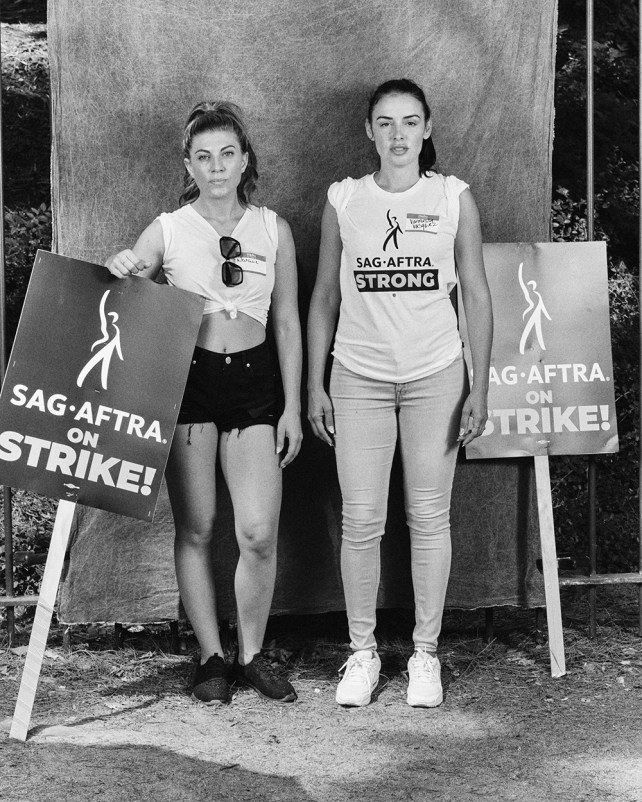
Natalie: I was always told that you could be a working actor and make a living—support yourself, your family, build a career around what you were passionate about without having to be an A-list celebrity. I believed that. I joined SAG in 2013 and that was true back then, there were residuals. You had to work hard to get on a SAG project, but it was worth it.
Right after I joined, more projects and commercials turned non-union, cut corners. New media came out to keep up with the changes in the industry, but really what happened was more people were getting on projects that were underfunded or were able to barely pay actors.
I went from jumping from project to project, making money to support myself, to having to go back into waitressing, and then ultimately now having an entirely new career; I’m a life and dating coach for men, and full-time filmmaker in an industry that’s being shackled by greed and bad deals. I thought that you still just had to work hard and once you were more successful in the industry, then you’d see more money. It absolutely broke my heart to finally see that leads of TV shows on streaming platforms are making less money in residuals than when I did a co-star on Burn Notice.
I strike because you shouldn’t have to be a huge celebrity or kill yourself hustling in order to survive and feed your family.
Vannessa: I was lead actor one of Hulu’s first original series for 4 years, from 2014-2018. We didn’t make enough to even pay our rent and never saw a single residual. I tried to speak up about the unfairness of it all and was received with the news that my character was getting killed off—even though I was number one. They said it was a financial studio decision between me and my male lead.
It was a very painful experience to work so hard for a show and not even be able to pay rent.
Starla Heinz
“SAG gave me grace. More grace than the world did.”
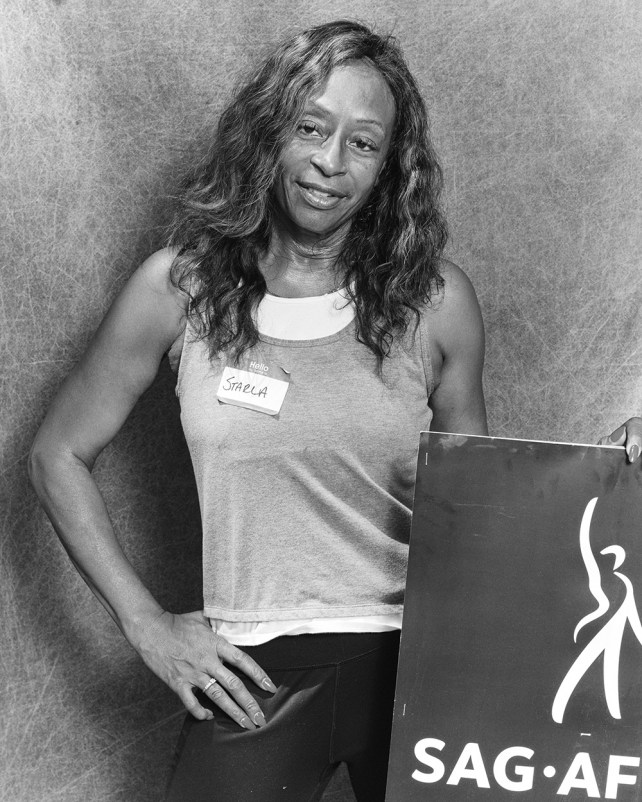
I am a San Francisco native. I love my city—however, sometimes, the things you love are not good to you. At 16 years old, I found myself homeless, living out of a shelter on Harrison Street. The shelter was proud of me for going to school while living in the homeless shelter so they relocated me to Southern California. Society thought I would be the next biggest screw-up. I was determined not to prove society right.
SAG treated me like family and never closed their doors on me or my dreams. As a stand-up comedian and actress, I believe SAG gave me grace. More grace than the world did. At this time SAG is standing up for the rights for all of my counterparts. We deserve to be heard and we all deserve a seat at the table without the feeling of someone looking at us like we are invisible or homeless. Like I felt many times on the streets as a teenager.
Sydney Baloue
“I was out on the picket line on Day 1 because my guild showed up for me.”

I’m so grateful to the WGA for my health care and for protecting my wages as a TV writer. It’s a massive shift from the world of reality TV where writers (“producers”) are not protected at all and exploitation is rampant. I was out on the picket line on Day 1 because my guild showed up for me. It only made sense for me to show up for them in return.
Since being on the picket line with my fellow writers and actors, I’m grateful that I’ve been able to come together with so many trans and non-binary writers to clap back at the exploitative practices happening in our industry, especially as it relates to trans and non-binary storytelling. I helped organize the #TransTakeover at Netflix on May 18. The stakes are different. We tell stories that literally save lives. TV, film, and media as a whole has the power to change the way people think.
As the ACLU reports, there are 492 [now 496] anti-LGBTQ+ pieces of legislation in this country. So much vitriol has been aimed at trans youth, we know that our stories are needed, not only for entertainment but also to restore humanity to those young people out there who feel like they have no hope and that no one understands them or cares. For us trans and non-binary writers, our “diverse” stories are often the first to get cut after these mega-corporate mergers as we are labeled as dispensable and “too niche.” Considering how the numbers are trending our way (1 in 5 Gen Z adults identify as LGBTQ+), exec talk is what it has been for a minute: cheap and full of hot air. Storytelling is our most powerful weapon to fight hate. I’m glad to be a warrior on the front lines fighting the good fight for my guild, for myself, and for the trans youth out there. There is no place to go but up from here.
Christopher Encell
“I’m striking to protect us from the AI bots who think they’re funnier.”
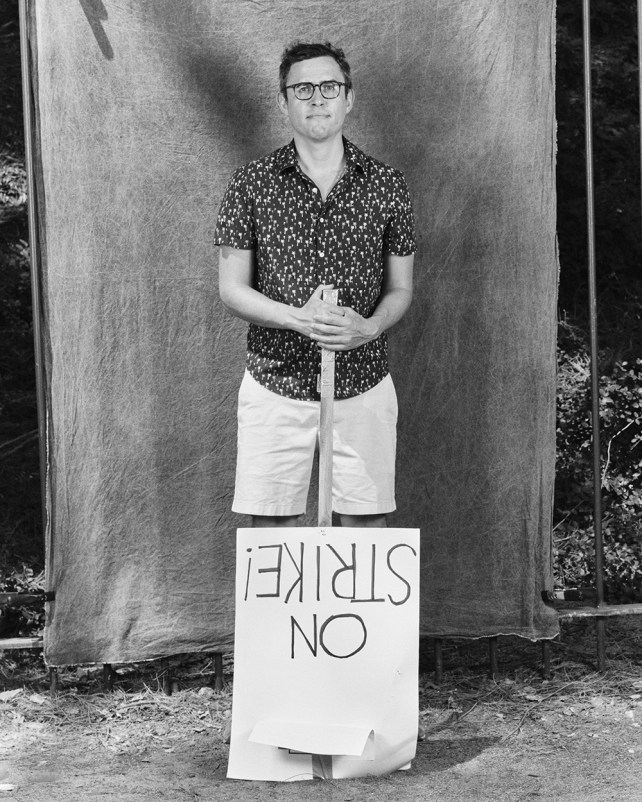
I’ve been very fortunate to have the career I’ve had. After years of being an assistant, I landed my dream writing job at The Good Place. While I was (this can’t be said enough) very lucky to get that job and somehow stay employed over the years, I kept hearing seasoned veterans tell me that things were very different prior to Netflix and shortened seasons. Residuals could carry you from year to year.
Now, you have to get multiple jobs per year, which can be quite difficult to come by. With shortened seasons, you get even less experience.
Here’s an example of a lot of young writers today: Imagine you land your dream job. You get to work on a cool new 10-episode series. You might work between 10 and 20 weeks on this show. In that time, you break stories and write scripts. Then, because the studios don’t find younger writers necessary in production or post, you are now unemployed and must find another job. The showrunner, and maybe one other person, stays on to table the scripts, re-write them, go into production, and then edit the episodes.
While these all sound like different things from being a writer—they all fall under the umbrella of writing. I know a lot of writers who have never seen a set or been inside an editing bay. I myself didn’t get into an editing bay until I was a supervising producer.
So I’m striking to make sure future writers have the skills to do the job long after me. Also, I’m striking to protect us from the AI bots who think they’re funnier.
Naledi Jackson
“We’re looking just for a little bit of fairness.”
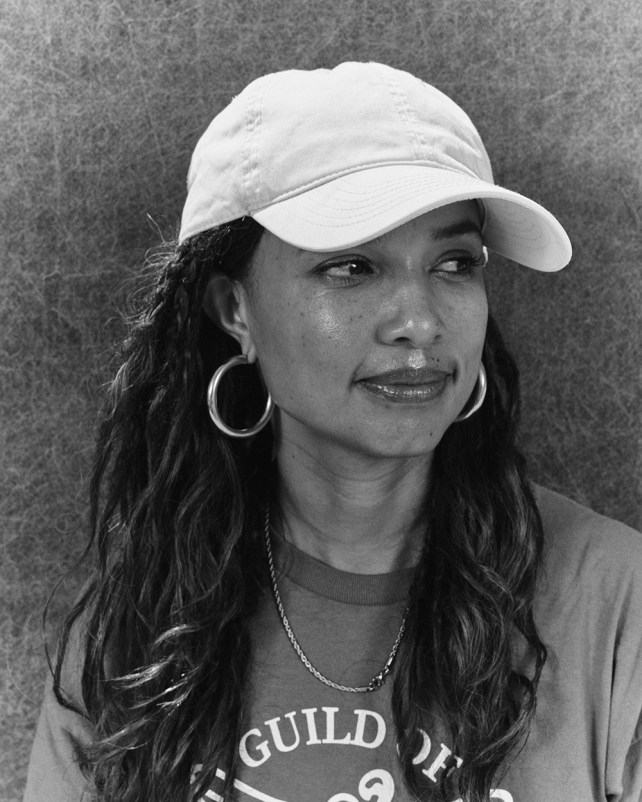
I’ve been a WGA member since 2020. I’m also a member of the Writers Guild of Canada. I moved here from Canada to work on a few shows like Outer Range on Amazon Prime.
The WGA is asking for two percent of the studio’s profits—it is not very much. I do feel like we deserve a living wage. I am also very much striking for regulation over AI. Keeping the human aspect of storytelling is very important.
I wasn’t around for network TV. Now, as it moves to these platforms, writers still aren’t getting residuals that reflect opportunities at the studios. I really feel that needs to change. There are caps on our salaries, whereas we’re seeing massive profits on the studio side. We’re looking just for a little bit of fairness.
Barry Brisco
“Actors that you see on television every day—that you think are banging out here in Hollywood—are driving for Uber.”
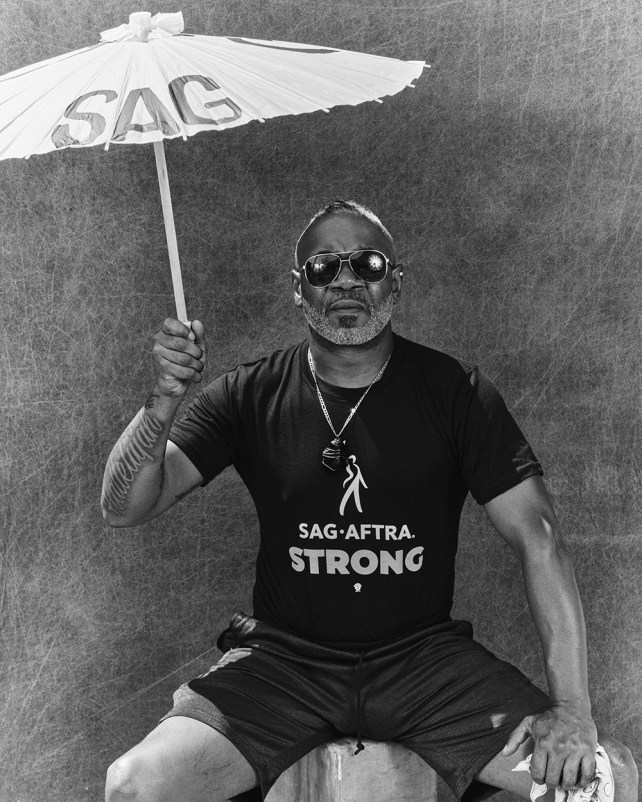
I literally have just got a residual check in the mail yesterday that was for $0.46. I mean, it costs more to mail it. It’s going to cost me even more money to drive to the store to cash that check. What the hell is that?
Look at the streaming. Look at everything that’s going on. I just did a Netflix show. They had me get dressed and they said: Before you go eat, go get scanned. I had no idea what that meant. But then when I looked all the stars of the show are standing there, I’m just like…you lead, follow, or get out of the way. There’s a hundred cameras in there. Put your feet on the little yellow things like you are at the airport. Cameras go up and down. Now, I no longer own my image? Nobody asked my permission. I didn’t sign anything for that.
There’s nobody in Los Angeles any summer. Why? Because they’re in the Hamptons. They’re in Paris. They’re in France. They’re on their yachts. We’re sitting here going: Oh, my God, what the F- are we going to do? When is work going to come back?
Actors that you see on television every day—that you think are banging out here in Hollywood—are driving for Uber, are delivering for GrubHub, are walking dogs for Wag. They’re doing whatever they possibly can do to pay their bills.
I’m working and I’m not a kid. People think that I’m in the position, like…they see me on shows. And they think that I have money. And I’m very grateful. But no, no, no, sweetheart. I didn’t make any money. I can’t loan you any. Don’t send me a cash app. I’m just an actor.
Liz Pullano
“If your business model necessitates not paying your employees a decent wage, then it’s not a great model.”
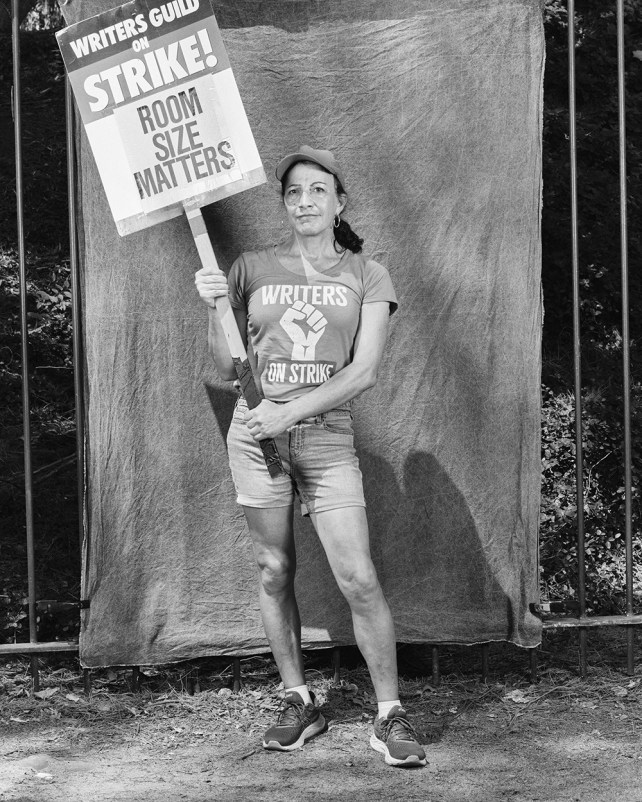
I feel our strike is emblematic of labor problems as a whole in this country, where those at the top are rewarded while most everyone else is barely getting by or not at all. If your business model necessitates not paying your employees a decent wage, then it’s not a great model.
And now, thanks to streaming, media consolidation, and corporate greed (among many other things), those of us who create all of the wealth in the industry are being turned into gig workers who struggle to get by. As a WGA writer, I’m fortunate to have a union to join the fight for fairness. That’s really all we’re asking for—fairness.
Emily Kincaid
“This isn’t just about actors and writers. This is about the majority of people.”

I’m really impressed by all of the actors coming out and being really honest about what they’ve been paid for shows. In Hollywood, it’s kind of the whole fake-it-till-you-make-it vibe. I get it. That’s what you all have to do, you know? But people are coming out and saying, “I had a series regular last year and three guest stars and I still didn’t make enough to get insurance.” [The threshold to qualify for] insurance is only $26,000. We should all be able to get there. And we’re not.
It’s really shocking. People, faces and names that you know, they’re coming out saying like: “I don’t have enough to pay my mortgage.” So it’s surprising. But, you know, I’m appreciative of the honesty of the transparency. The transparency, I think, is helping everyone realize we really are in this together, and we’re not as far apart as we may have once thought.
We had the hotel union down here last Friday. This Friday Starbucks is going to be here. This isn’t just about actors and writers. This is about everyone. This is about the majority of people. You know, the not one percent that’s making money for this huge company and are not living an easy life. We all have multiple jobs and we shouldn’t have to.
Jordan Morris
“The fact that these companies would shut down a whole industry over two percent of their profits is just insane to me.”
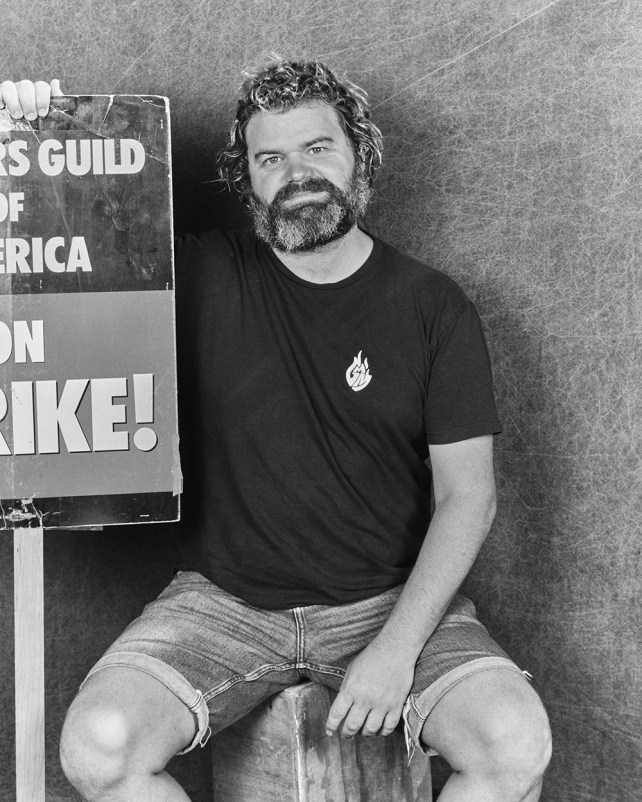
I’ve been a WGA writer since 2008. I got my guild card from a writing job on a Comedy Central late-night show called @Midnight. I feel so lucky to get paid to write, but the business side of our industry is getting steadily worse. Pay is going down while corporate profits are up. It’s not just lower pay when you land a job but smaller writing room sizes, which mean there’s fewer jobs to go around.
The statistic that I keep going back to is that it would cost these companies around two percent of their profits to give the writers everything they’re asking for. The fact that these companies would shut down a whole industry over two percent of their profits is just insane to me.
I’m striking not just for myself and my peers, but for future writers who want to make a living with their art. The fact that studios refuse to bargain when it comes to AI portends a depressing future where writers are just there to spell check barfed-out AI scripts. Creativity will suffer and the end products will suffer. If you love TV and movies, a future where all we get is AI scripts should bum you out.
I love writing for a living and I love my WGA community. Hopefully, the studios can see past their bottom line and give hard-working creatives their piece of the pie.
Rell Battle
“I think people see TV and assume they’re all rich. That’s just not the case.”
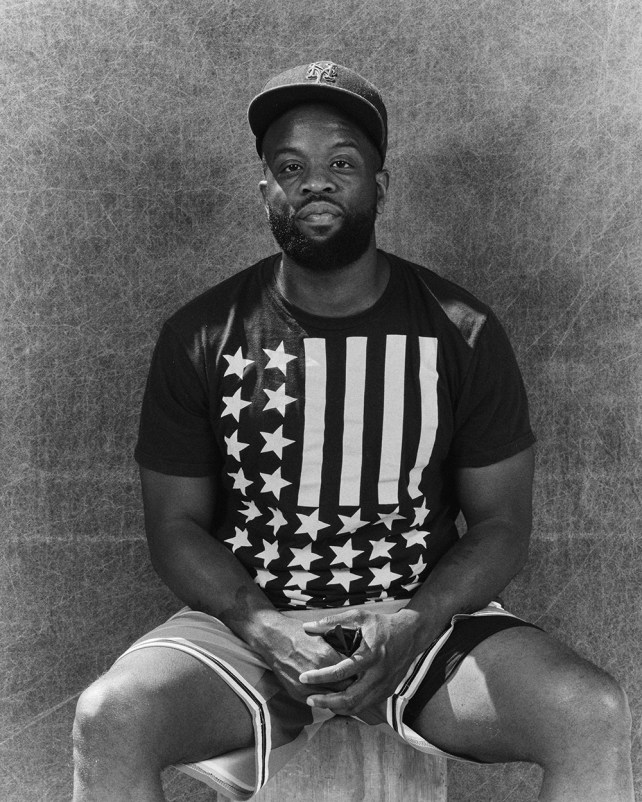
I qualify for insurance. I’m one of the lucky ones. For my brothers who aren’t in a position, where they can’t qualify, I was there five or six years ago. So, I think it’s important for me to show face.
I think people think because it’s Hollywood, everybody’s Tom Cruise. About one percent are living off of their work. So, most people aren’t getting as much as your son or daughter in a mall, you know? I think people see TV and assume they’re all rich. That’s just not the case.
Sachin Bhatt
“One of the things we’re fighting for is to get a lock on AI.”
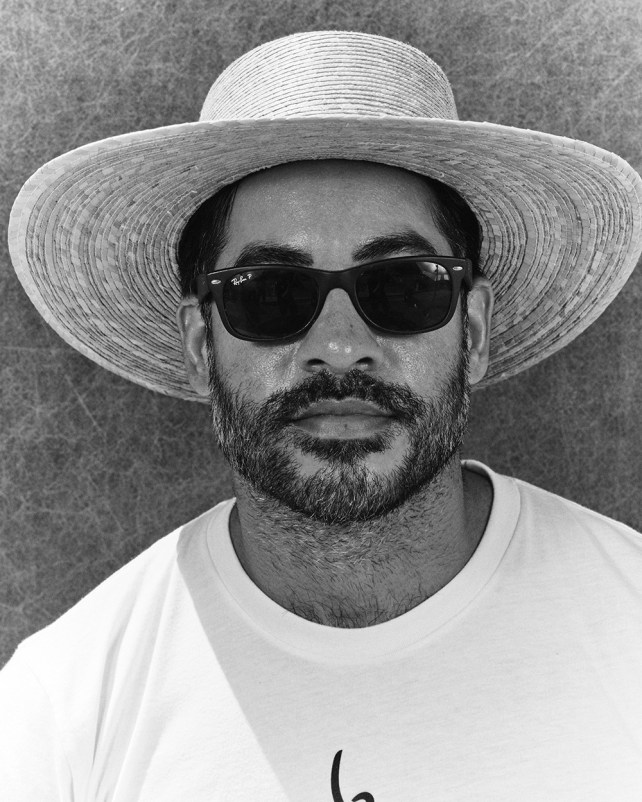
One of the things we’re fighting for is to get a lock on AI. It seems like a scary thing, but part of it is we can’t use my likeness in perpetuity. You can’t use it without my permission and you need to be compensated. I think that’s part of the fight is to protect ourselves from what could happen. It shouldn’t be you do the one job and then it gets to live somewhere forever and we don’t get compensation for that. That’s our work. That’s my work that’s out there and I should be able to make money off of that.
Kenneth Davitian
“This is what I want to do. This is what makes me alive.”
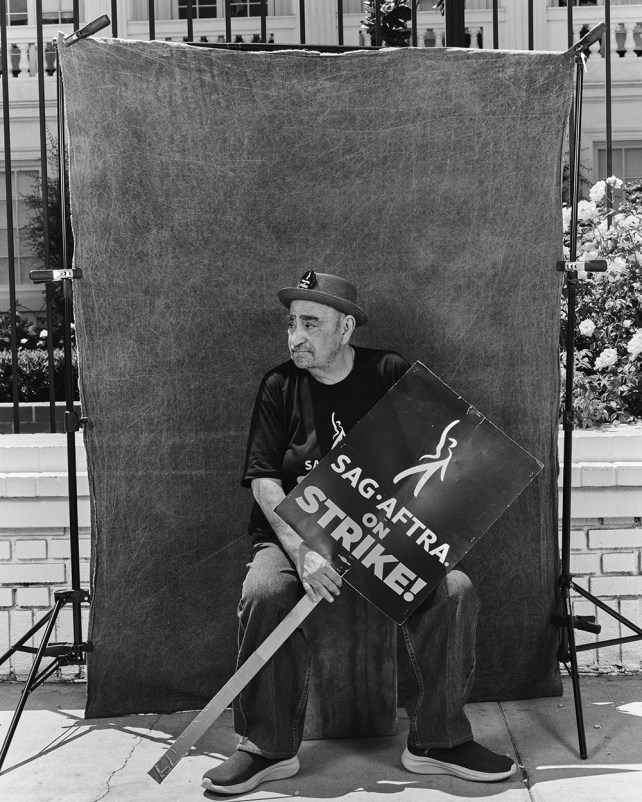
I’ve been a member of SAG since 1990. I was out here in 2008. I’m 70 years old and I’m out here again.
I’ll tell you one thing an AI can’t do: I don’t think it can resolve a problem that’s on the set. Somebody says something wrong and you say something right and then tell them what they’re wrong is, and we keep going. I don’t think AI has got a soul. It’s only something to save money for people who have a heck of a lot more money than I do.
The problem is the salaries of actors. I’m talking about extras and I’m talking about co-star guest stars. They have not risen as much as inflation has. People are like, “Oh, come on, you’re an actor. You’re a millionaire.” No, if it wasn’t for residual checks, I’d have a real big problem. We get paid and then we don’t work for six months. That’s the hard part. Actors say that it takes 300 days to get a job doing 65 days of work.
I have a theater degree. This is what I want to do. This is what makes me alive. So if I can’t do it and they’ve got something that looks like me, it’s going to ruin a lot of lives.
